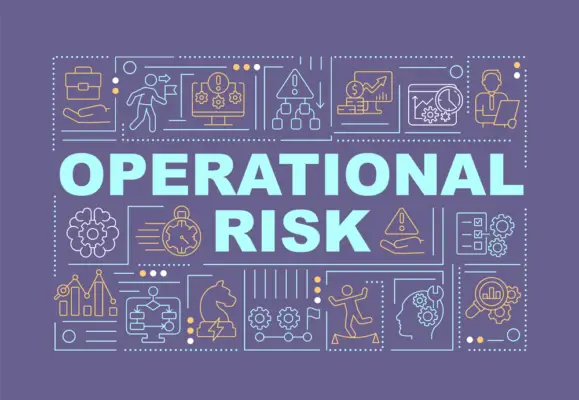The Operation Risk Manager is responsible for identifying and evaluating potential risks within an organization’s operations and developing strategies to mitigate and manage those risks.
They work closely with different departments to understand their processes and procedures and identify any potential vulnerabilities or weaknesses that could lead to operational failures or disruptions.
They also conduct risk assessments and analyses to prioritize risks based on their potential impact and likelihood of occurrence.
The Operation Risk Manager then develops and implements risk management plans and strategies, including implementing control measures, creating contingency plans, and providing training and education to employees to ensure they know the risks and understand their roles and responsibilities in managing them.
Additionally, the Operation Risk Manager monitors and reviews the effectiveness of the risk management strategies and makes adjustments as necessary to ensure continuous improvement in managing operational risks.
The role of an Operation Risk Manager is crucial in helping organizations maintain the stability and efficiency of their operations while minimizing the potential for losses and disruptions.
As businesses navigate an increasingly complex world, there’s a growing demand for adept professionals skilled in managing operational risks.
An integral part of any organization, Operational Risk Managers become shield-bearers, identifying potential pitfalls and introducing strategic measures to minimize risks.
Dive into the intricate world of this profession as we delve into the core responsibilities of an Operational Risk Manager, explore requisite qualifications and skills, and study real-world case scenarios, unveiling the profound consequences of efficiently executed risk management strategies and the repercussions of its absence.
Essential Duties of an Operational Risk Manager
Role of an Operational Risk Manager
An Operational Risk Manager is critical in planning, directing, and coordinating organizational risk management activities.
They are tasked with developing and implementing risk assessment models that help the organization anticipate and mitigate potential operational risks.
Creating Risk Assessment Models
Creating risk assessment models is another key duty of an Operational Risk Manager. They design these models to predict potential risks in an organization’s operations and measure the potential impacts of these risks.
Risk assessment models help the organization create risk mitigation strategies that minimize the impact of potential operational risks on business continuity and operational efficiency.
The risk manager will then present the models to the senior management team with recommendations for changes in processes or policies that could reduce potential risks.
The advice and guidelines they provide tend to have a significant influence on the organization’s risk management strategy and policy.
Working with Various Departments
An essential aspect of an Operational Risk Manager’s role is working closely with various departments within the organization. They ensure all departments are aware of potential risks and are prepared to respond effectively.
They also help departments understand their critical role in risk management and how their efforts contribute to the organization’s overall risk posture.
They educate and train staff on risk awareness, ensuring everyone understands the risk management processes. They also coordinate with departments to establish and implement controls to effectively manage identified risks.
Understanding the Role of an Operational Risk Manager
Operational Risk Managers are the key persons responsible for identifying and mitigating operational risks. They require a thorough grasp of an organization’s operational procedures, industry landscape, and all external factors affecting risk.
They routinely classify potential risks through sophisticated evaluation and analysis processes, ranking them concerning their potential impact.
In case of the identification of any potential risk, an Operational Risk Manager designs mitigation strategies to reduce or abolish these risks significantly, followed by working closely with the management for their effective implementations.
Their approach towards risks is always proactively preventative rather than reactively remedial. This approach protects organizations from potential losses, ensuring optimum utilization of resources.

Skills and Qualifications for an Operational Risk Manager
The Skill Set of an Operational Risk Manager
With the fast-changing business domain, Operational Risk Managers play a pivotal role in organizations, primarily analyzing, controlling, and mitigating operational risks.
The quintessential skill set for this role includes analytical aptitude, innovative problem-solving, excellent communication, and decision-making skills, which ultimately help identify and counteract potential risks.
Sharp analytical ability is integral to an Operational Risk Manager’s role. They should be apt to break down complex problems and huge data sets to derive significant information.
They must stay ahead of business trends and developments, which they can tie back to potential organization-specific risks and opportunities.
Problem-solving abilities are as crucial as analytical skills. Operational Risk Managers must creatively strategize solutions to mitigate operational risks, which requires planning and strategizing for current and potential future issues.
Superior communication skills are also vital for an Operational Risk Manager, as they need to articulate the nature and impact of risks to diverse stakeholders such as board members, employees, and partners. This ensures everyone is on the same page regarding risk management.
Furthermore, Operational Risk Managers should be strong decision-makers capable of assessing various options in risk management scenarios and making critical calls swiftly and accurately.
Understanding risk management tools, models, software, and strategies is also essential. These technologies can significantly enhance the precision and efficiency of risk evaluation and mitigation procedures.
As for the academic criteria, a bachelor’s degree in a related field like business administration or finance is usually required, though many organizations prefer an MBA or another advanced degree.
Having significant experience in risk management operations, preferably at senior levels, is usually required. Professional certifications like the Financial Risk Manager (FRM) or Certified in Risk and Information Systems Control (CRISC) and familiarity with risk management regulations such as Basel III can prove extremely beneficial. This not only ensures regulatory compliance but also minimizes legal risks involved.

Real-world Implications and Case-studies of Operational Risk Management
Operational Risk Management: A Pivotal Function for Business Success
In straightforward terms, operational risk management is a process of finding potential risks that could disrupt a company’s operations, evaluating these risks, and then implementing strategies to reduce or eliminate the risks.
This process is a vital aspect of business management. It significantly affects a company’s stability and can directly impact its overall success.
Case Study: The Failure of Risk Management at BP
In 2010, the BP oil disaster demonstrated what could happen when operational risk management is ineffective. Despite having state-of-the-art technologies and comprehensive safety procedures, BP failed to prevent a catastrophic accident from occurring at its Deepwater Horizon drilling rig in the Gulf of Mexico.
The company was highly criticized for its risk management practices. For instance, it was found that BP made significant budget cuts in its operations and maintenance department, which increased the risk of an accident. Additionally, it ignored several warning signs that indicated potential equipment failure.
As a result, the explosion occurred, leading to 11 deaths and disastrous environmental damage. This catastrophe cost BP approximately $65 billion in cleanups, settlements, and penalties.
Case Study: The Success of Risk Management at Microsoft
On the other end of the spectrum, Microsoft exemplifies a company that has successfully implemented its operational risk management.
The tech giant has a well-oiled system for managing risks, which they call the risk management ecosystem. This systematic approach consists of a full-loop structure that involves risk identification, assessment, response and monitoring, and communication about those risks.
One of the keys to Microsoft’s risk management success is its ability to manage its operational risks in-house rather than outsourcing them. This offers a more controlled and efficient management of potential risks.
Also, the company has a team of risk professionals dedicated to managing, reducing, and, where possible, eliminating operational risks.
This proactive and efficient risk management has allowed Microsoft to avoid substantial monetary losses and maintain a positive business reputation.
Critical Role of Operational Risk Managers
The aforementioned case studies illustrate just how critical the role of an operational risk manager is within a business structure.
These professionals ensure that potential risks are appropriately identified and mitigated to avoid any negative impact on the company’s operations, financial stability, and reputation.
This includes establishing risk management policies and procedures, performing risk assessments, and implementing risk mitigation strategies.
Also, operational risk managers are crucial in educating and training employees about risk awareness.
This equips them to handle potential risks and fosters a culture of risk-awareness in the organization, which is crucial for long-term business sustainability.
Final Thoughts
To sum up, the real-world implications of operational risk management are significant. If effectively applied, it can protect companies from substantial losses, business disruptions, and damage to their reputation.
Conversely, a lack of robust operational risk management can lead to catastrophic consequences, like in the case of BP. Therefore, operational risk management is a vital aspect of overall business management that organizations of all types and sizes should prioritize.

Conclusion
Embarking into the world of Operational Risk Managers, we witness their tremendous role in navigating the challenging seas of organizational risk.
The case studies we analyzed underscored the essence of risk management, shedding light on the repercussions of a lack of this critical function and the prosperity that effective risk management strategies can bring forth.
Bearing the right set of skills and qualifications, Operational Risk Managers have the power to guide organizations through uncertainty and into a secure future. They wear prudent masks, shielding the entities from potential threats while paving pathways for growth and prosperity.

Chris Ekai is a Risk Management expert with over 10 years of experience in the field. He has a Master’s(MSc) degree in Risk Management from University of Portsmouth and is a CPA and Finance professional. He currently works as a Content Manager at Risk Publishing, writing about Enterprise Risk Management, Business Continuity Management and Project Management.

